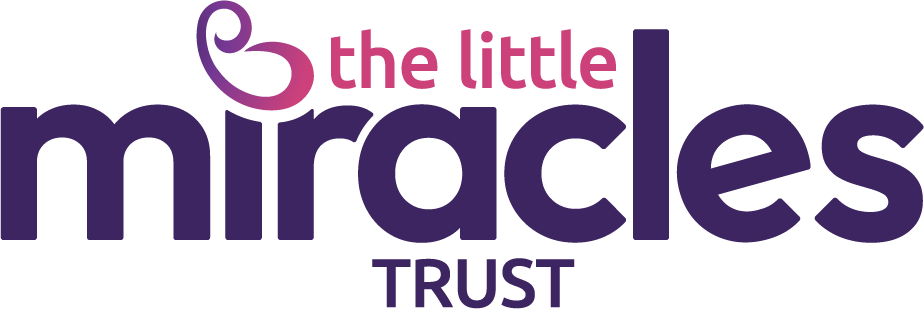As told by mum, Kristin
It seems quite fitting that we have been reflecting a lot on the past year as we approach our daughter’s 1st birthday. This last year we have experienced the highest of highs and the lowest of lows and has been the hardest and most challenging of my life. Although we have had to overcome so many hurdles, we still feel incredibly blessed.
My first introduction to Neonatal life in hospital began with my oldest; Leo in 2020. I had a straightforward pregnancy with no complications, and in fact I had just finished work on the Friday with 6 weeks of pre-planned annual leave before my due date, when my waters broke that evening. This was at 34 weeks, and I hadn’t even contemplated a premature birth. We hadn’t even packed our hospital bag yet. We went into the maternity ward at New Plymouth base hospital, and fortunately I hadn’t gone into labour. I was given the important steroid injections, and then sat and waited.
When Monday came around, we had another scan and found I had lost the majority of the amniotic fluid. It was hard not being able to feel the babies movements and anxiety levels were at an all-time high. We were told that if we really wanted to, we could go home but being in hospital was the safest place. We lived 20 mins drive away, so decided that by Tuesday if there was still no action we would head home. Leo had other plans, and he arrived just before 8pm on Tuesday evening at 34+3 weeks gestation.
The birth went well, all things considered, with intervention right at the end to help with the delivery. The room became very busy right before Leo’s arrival with the paediatricians and Neonatal nurses ready to assist. Leo did extremely well and was breathing on his own once born. What a relief. We even managed about 30 seconds of skin to skin before the team properly checked him over.
After delivering the placenta and showering, we were able to visit our wee man in the Neonatal Unit where he was in an incubator and doing really well. He stayed in hospital for 4 weeks with no complications. He just needed to grow, put on weight, and we had to establish breastfeeding.
While it was hard leaving Leo in hospital every day as I went home in the evenings, I do recall one of the big positives was learning to breastfeed in a very relaxed way. He had an NGT (nasal gastric tube) and was such a relief that while I learnt to feed, he was never left hungry, so the stress was taken away. I remember sitting there with a nurse chatting away while Leo fed, and I was so grateful for that experience. Towards the end of the 4 week stay we were able to room in with Leo, and started to get into our own routine of feeding and sleeping as a family of 3.
Little did I know that my experience with Leo’s premature arrival would prepare me for our daughter, Emily’s arrival at 24+3 weeks gestation last year in 2023. I thought giving birth at 34 weeks was scary; it was bloody terrifying at 24. Emily’s pregnancy was relatively straight forward also, and I was looking forward to reaching full term, and having all those 1st experiences with her after birth in the maternity ward – skin to skin contact, breastfeeding, having the baby sleep in my hospital room and being discharged soon after to go home. All the things I missed out on with Leo.
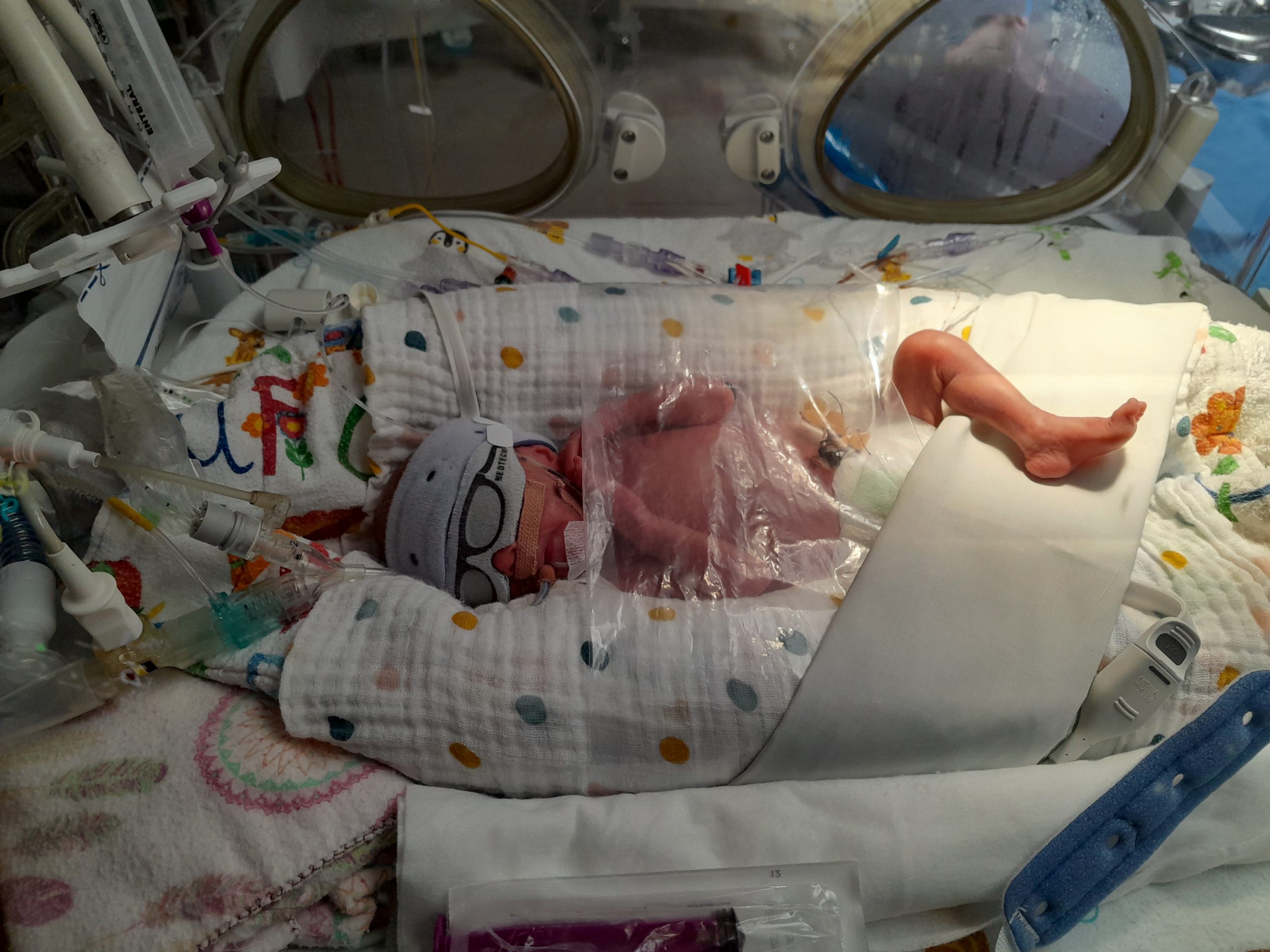
During the week in the lead up to Emily’s birth, I had a few niggles that I ran past my midwife. I had a referral to an obstetrician (due to Leo’s premature birth) for later on in the pregnancy but otherwise was under the care of my midwife. I even just texted her – that’s how irrelevant my niggles felt. Luckily, she took me seriously and had me come in for a physical exam at the hospital with an obstetrician.
Fortunately, I was reassured that everything looked fine. There was so much relief. A quick google of births at 23 weeks did not read well, and quite honestly freaked me out. An important note – google is not your friend in these situations and always shows you worst case scenarios which was frightening.
The next day I began to get cramps which I initially put down to constipation, but when I went out for a drive to run some errands, and had a clock in front of me, I realised that the cramps were coming too consistently at about 10 minutes apart. Again, my midwife organised for me to stay overnight in hospital for observation. The cramps were very faint, and I barely batted an eyelid, and I was able to hold conversations without being affected by pain. The obstetrician in hospital didn’t believe I was in labour but agreed that I should be monitored overnight. At about 4am the next day the cramps ramped up and bleeding began. After a physical exam it was confirmed I was in labour, 3cm dilated.
Its hard to explain the thoughts that go through your head when given this news. I was by myself at this point as my husband had gone home to put our son to bed and stayed at home overnight. I was terrified and beside myself. I remember speaking to the obstetrician and asking what the odds were for the baby to survive. I’m not sure if this was the best approach, but the news of 50/50 odds of baby surviving and having no long-term affects was very sobering and hard to hear.
It was amazing at how quickly everything happened from this point on. I was given the important steroid injection just as I had with Leo, but also given the magnesium sulphate through IV, along with a raft of other drugs to try and stop the labour. My husband joined me an hour or so later and I was helicoptered down to Wellington a few hours after it was discovered I was in labour. Thankfully the medication did the trick and the contractions stopped which gave us a brief moment of relief.
Once in Wellington I was given the 2nd steroid injection as well as more magnesium sulphate. After a night in the delivery suite on hourly observation, I was moved to the antenatal ward and given the news that I was to stay in Wellington Hospital until the baby was born. I was still 16 weeks away from my due date, and while I was thankful that Emily was staying put inside, I was also quite upset at the prospect of being stuck in hospital in a city miles away from my immediate family and friends. While on the ward we got to speak to one of the lovely paediatricians who told us what it would be like to have a baby at 24 weeks, and with each day and week baby stays put, the better chance they had. We felt very informed, but equally scared about our situation.
I didn’t have to ponder too long during my stay in hospital as Emily decided it was her time after 2 nights. My waters broke and was told they weren’t going to try and stop the labour this time as the all-important medication for lungs and brain development were on board. The labour itself was straightforward. The only unusual (but very annoying) issue was the CTG can’t be used on that gestation, so the midwife had to get a manual audio reading with the fetal doppler after each contraction.
The room became very full again as it did with Leo’s birth, just as Emily was about to be born and she arrived just before midnight, 3 days after we arrived in Wellington, weighing 862g. This is apparently a really good weight for a 24 weeker, and more like 28 weeks.
Due to the delicate and vulnerable nature of Emily at that age, she was wrapped in a plastic bag to ensure her body temperature didn’t drop too much. Once she had been ventilated and checked over by the NICU doctors, she was placed in my lap briefly. It was so overwhelming, but from the moment I saw her I knew she would be a fighter. She was taken away in an incubator, with my husband following closely behind. It’s a strange feeling getting into bed after delivering your baby in hospital and not having them by your bed. I crawled into my bed on the ward sometime around 4am after visiting Emily in NICU and checking on how she was doing.
And so began our NICU life, and new routines formed over the next 3.5 months. It’s a strange time; the high dependency rooms where Emily spent several weeks had no exterior windows/natural day light except for a small skylight. You spend the majority of your time indoors, listening to the beeps and alarms going off around the room, accompanied by the low buzzing of the breast pump which became essential -every 3 hours.
To start with, my husband stayed for another week before returning to work. He has amazing employers who allowed him to take every Friday off, and so he would return for the weekend with our son. My parents offered to have them stay at their place during the week to take the pressure off; something I’ll be eternally grateful for. As I was a stay-at-home mum, we didn’t have regular childcare set up, so relied on our parents to look after Leo to make sure his world wasn’t turned upside down. My parents would also travel down on most Sundays, so Leo could stay another couple of nights with me, and of course to support me and visit Emily.
We were told to expect many ups and downs during our NICU stay, and they were so right. Just when Emily would improve and progress nicely, she would take a couple of backwards steps. We always felt that she was cared for so professionally and lovingly. The staff truly are amazing. It is hard to articulate how much we appreciate their skills and expertise, and even just a friendly ear as we spent so much time there at the unit. They saved Emily’s life on a number of occasions.
Emily came off the ventilator on day 4 and went on to NIPV. We were then allowed our first cuddle which was truly amazing and actually far sooner than what we had expected. Very unnerving holding the precious wee bundle and was not an easy feat to move her from the incubator to the armchair with all the tubes and monitors that were on her. For a long time, we kept this to once a day as it was quite tiring for her. I would wait till the afternoon to have my cuddles mostly so I had something to look forward to and there would be minimal interruptions.
Emily had a couple of infections during her stay. The first 1 on day 17 when she started to get a temperature. It was amazing at how the medical staff stayed on high alert and started her on antibiotics just in case while waiting for test results.
We’re so thankful for this proactive approach.
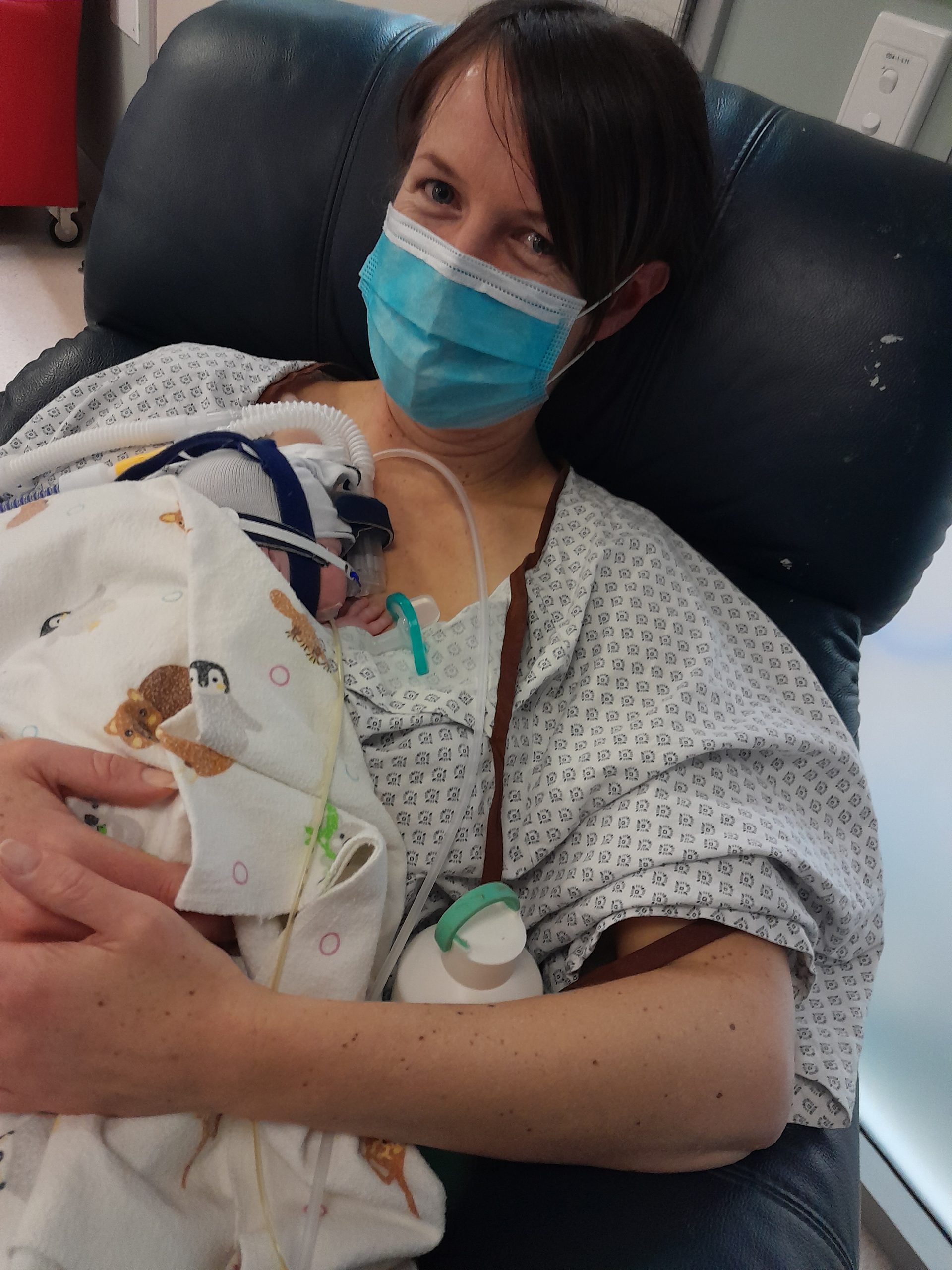
This infection turned out to be a Staph Aureus infection, and by the time this was confirmed, she was already well into her course of antibiotics. Once she was showing signs of recovery, the slow transition back onto breast milk and reduction in respiratory support began. On Day 44 she contracted another infection which turned out to be a Strep Group B infection. Emily became critically ill and went downhill so quickly and became overwhelmed by sepsis.
No words can describe how it felt to see your child so unwell, and we were later told that once or twice a year they get 1 or 2 babies who become this critical through infections. It was just so unfortunate that Emily was one of them. It coincided with a weekend that Lew and Leo visited. I would’ve been a complete mess if I was there by myself as we had countless meetings with doctors and specialists as a plan was made for her treatment.
They let Leo come into the family room in the unit for the morning so my husband and I could be there together. They suspected that she had a twisted bowel so had to rush her off to theatre, as there wasn’t time to diagnose her through conclusive testing before surgery. It turned out that her bowel was ok, but still had Peritonitis. There was so much swelling in her abdomen that the surgeons couldn’t put all her intestines back inside and close, so left her with what they called a silo, covering the protruding intestines. 2 days later, once the swelling had gone down and Emily had recovered somewhat, they took her back to surgery to close. Emily came through this infection so well, such a little fighter. Just like her earlier infection, there was slow progress to get back to full milk feeds and reduction in respiratory support. A few days after her surgery she came off the ventilator and got to have cuddles again. Such a relief to have her in my arms again.
I would say one of the big challenges for my family and I was the separation and isolation for me. It was tough getting through the week by myself and I missed my husband and son like crazy. I also felt immense guilt for not being there with them and felt like I was missing out on seeing my son grow and develop. Each week when I saw him it seemed like he had grown so much, and his vocabulary was just improving 10-fold. I knew he was being taken care of very well, and I just had to keep telling myself I had to be there with Emily. I know my husband found the separation tough and the twice weekly 4.5hr travel taxing.
I too had a stint in hospital, around 4 weeks postpartum. It just so happened to be a weekend that my husband and son had stayed back in Taranaki as they were unwell. In the night I developed cramps and heavy bleeding, so had to take myself to ED, a few hundred metres up the road. I had been well up until that point, so the doctors were confused as to why it had happened suddenly. After several examinations, it turned out I had retained placenta, and needed to have surgery to ensure nothing else was left behind. I also needed 2 blood transfusions and an overnight stay, so it was quite the ordeal. Having to go through that alone was quite traumatic made me miss home incredibly.
For a long time, it felt like little progress was being made with Emily’s condition, but then it was suddenly like she turned a page, and her respiratory support was reduced and she made some healthy weight gains. Then came moving day from the high dependency rooms. What a day! Cot movements always made me feel uneasy; you get used to your little area to sit in, like it was your space then suddenly it was all changed. This happened a few times within the high dependency rooms, but to move out of those rooms and have an exterior window and see daylight! Instant mood lifter.
Then began more milestone moments; the 1st bath, the 1st outfit/clothes, 1st breastfeed (on empty breast), such little moments but meant so much. Moving from CPAP to High-flow oxygen meant we were finally able to see her face without a mask and chin strap squishing her face. So much cuteness!
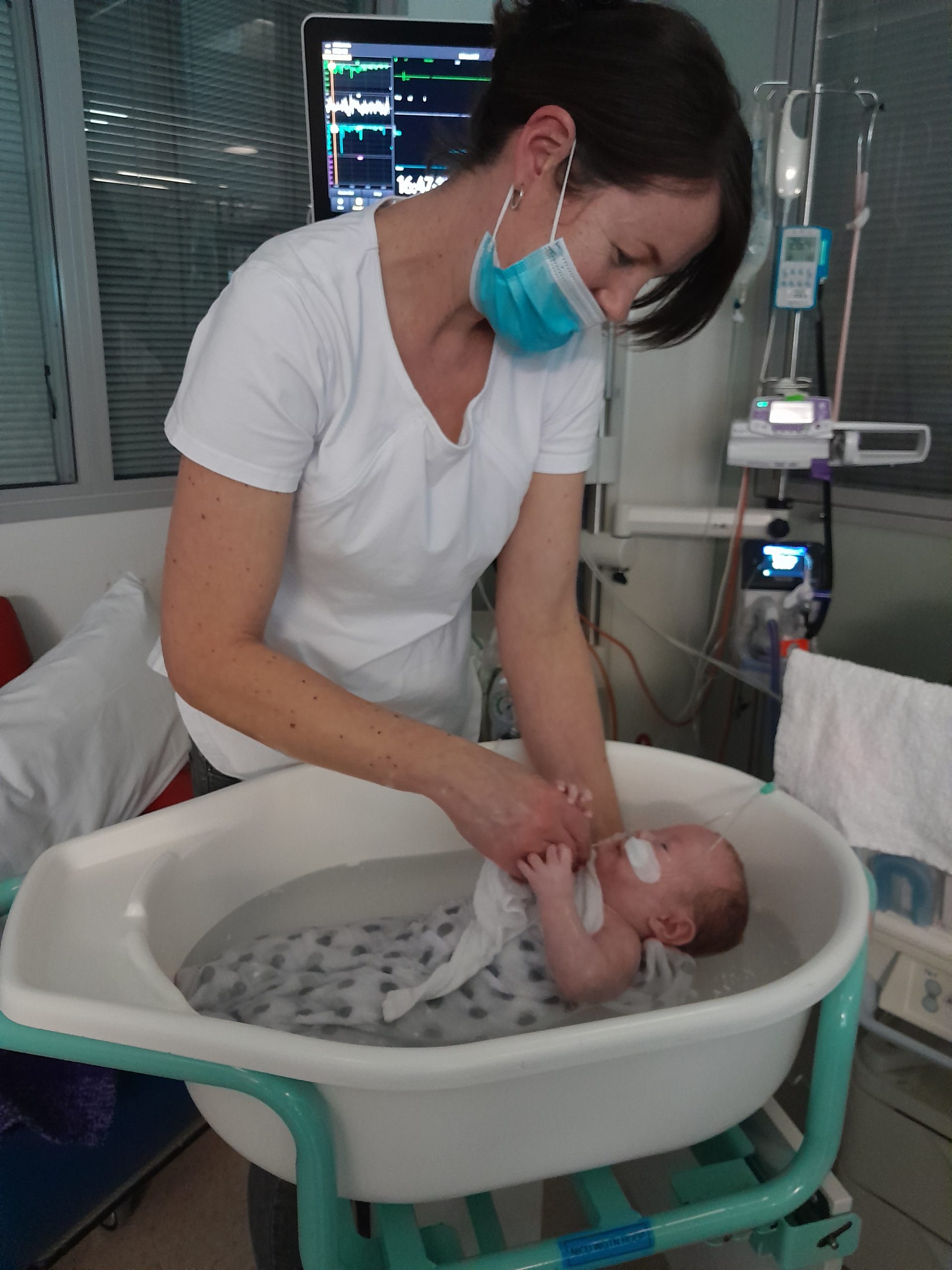
One big highlight was the moment that my son got to meet Emily. He met her briefly in the high dependency room when she became critically ill and we were able to bring him into the family room. I don’t really like to count that as his first meeting as it was such a horrible time for everyone.
This particular day, day 70 of her stay, Emily was trialled on low-flow respiratory support. This meant that she could be hooked up to a portable oxygen tank and be moved around with ease. I was able to convince the nurse to take us out of the unit and down the corridor to the whanau room where Leo would be allowed to go. Such an amazing moment. There was no touching or cuddles, but he could finally see his sister in the flesh. It must’ve been such a confusing time for him to have his family split up, have a sister and not get to see her.
As it turned out, Emily didn’t last long on low-flow, and had her respiratory support increased over night but I was just so happy Leo had that opportunity while he was visiting.
About day 76 there started to be talk of Emily being transferred back to New Plymouth Base Hospital. Music to my ears!
Just as I was beginning to get excited about a potential move, we heard that the Neonatal Unit in New Plymouth had just uncovered some major maintenance issues when a water leak was discovered in the wall along with black mould.
The babies in the unit were quickly transferred to the paediatric ward in the hospital but there was a hold on transferring any babies until the unit was opened again.
To say I was utterly disappointed would be an understatement.
It wouldn’t be until Day 97 that we would get our chance to come home.
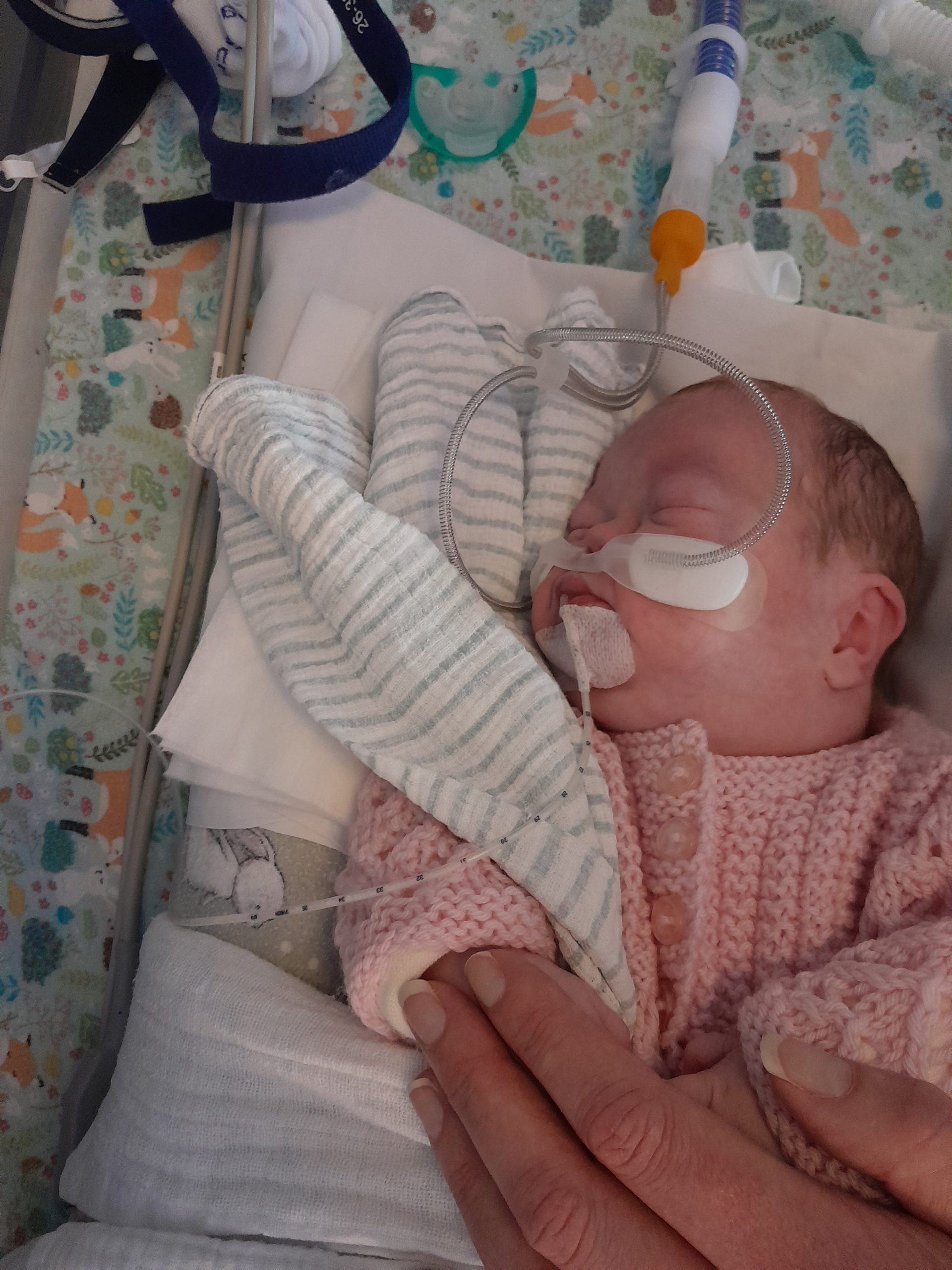
Day 97. What a day! I got told in the morning that New Plymouth had space, but the hospital still needed to confirm a few things.
I still didn’t believe it until we were in the air on Life Flight.
It was such an emotional day; as we left the unit, Emily in a portable incubator strapped onto a stretcher, the doctors and nurses lined the corridor and clapped as we walked out. I was crying the happiest of tears as I walked behind my baby being taken home.
To get a glimpse in the air of that familiar coastline and Maunga, I was ecstatic. My husband met us at the airport, and Emily and I were then taken by ambulance to New Plymouth Base Hospital.
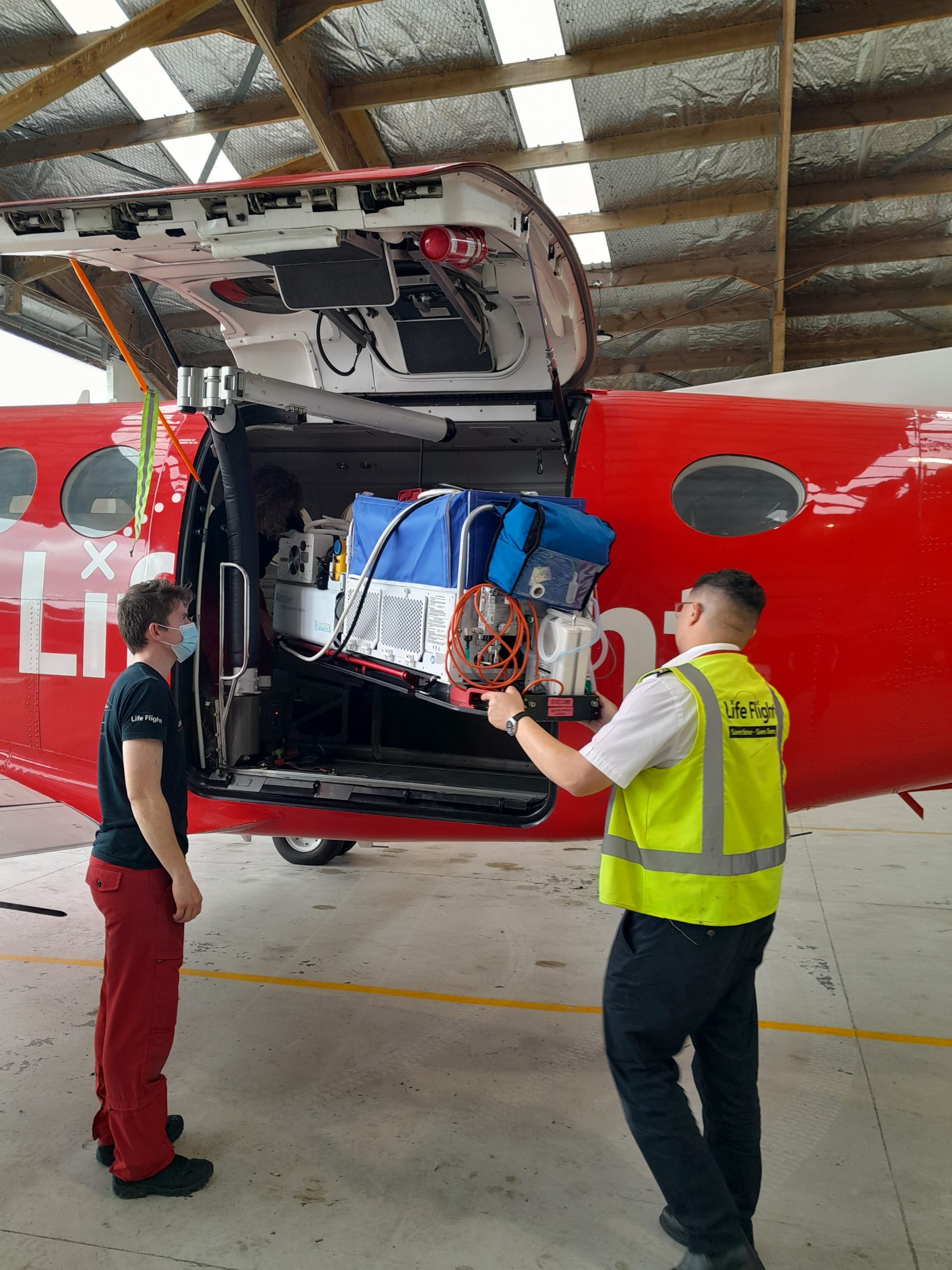
Emily settled into New Plymouth Hospital well. It was amazing being back at home with the rest of my family, and I began the daily commute into see Emily, and try and breast feed her for as many feeds as possible before heading home again. It was a hard adjustment, and I sympathise with other NICU mothers who had that gruelling commute to do. I had to organise childcare for Leo, sometimes doing an hour round trip to get to the hospital, all the while trying to race to either express or try and catch Emilys feed time.
The differences between hospitals were noticed as well; Wellington NICU team were very structured and you got to see the consultants on the regular. In New Plymouth, they seemed to be much more relaxed, and divided their time between the NNU and the Paediatric Ward. It took a while to get used to that.
On Day 109, the original due date, Emily went onto low -flow respiratory support and stayed there. This then set in motion the potential for us to get home soon.
I started rooming in on Day 121 to establish a good breastfeeding routine. As it turns out, this was much trickier than I thought.
I knew I had a low milk supply, something I had discovered with Leo, but also with Emily I had taken medication from early on in our journey to help with milk supply. I had begun mixed feeding with Leo by 3 months but Emily needed this right off the bat. So many tears and frustration at not being able to feed Emily as I had hoped. Emily also didn’t gain weight, and tired quickly when feeding. Her NGT remained, and so a trio of feeding techniques began. I breastfed first, then topped up with a bottle, then anything not drunk would go down the tube.
I think back to these early times, and it truly was a hard time. Feeds took about and hour and a half along with cares and nappy changing.
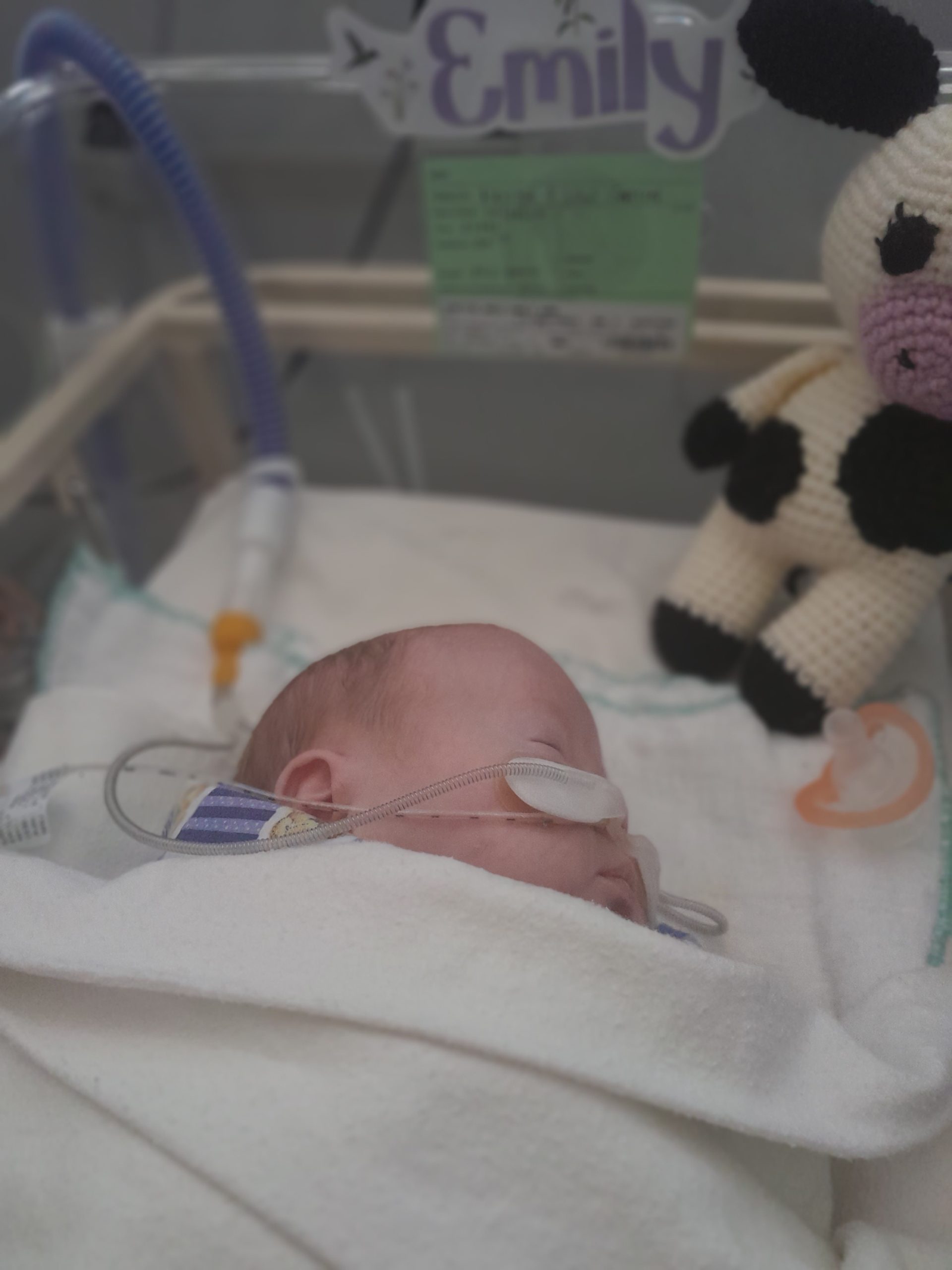
Day 130 was the day that we got to bring our girl home.
Her first 130 days was truly like a rollercoaster, but as 1 chapter ends, a new 1 begins as we brought Emily home and began our lives as a family of 4 all under the same roof.
Leo finally got to have that first cuddle with his sister, so many months after she first came into this world.
Emily was discharged with low flow oxygen and an NGT, but we felt fully supported by the community Neo Natal Nurse/Paediatric Nurse, Speech Language Therapist and Occupational Therapist who made regular visits at home to check up on Emily, regular weigh ins, and see how she was progressing.
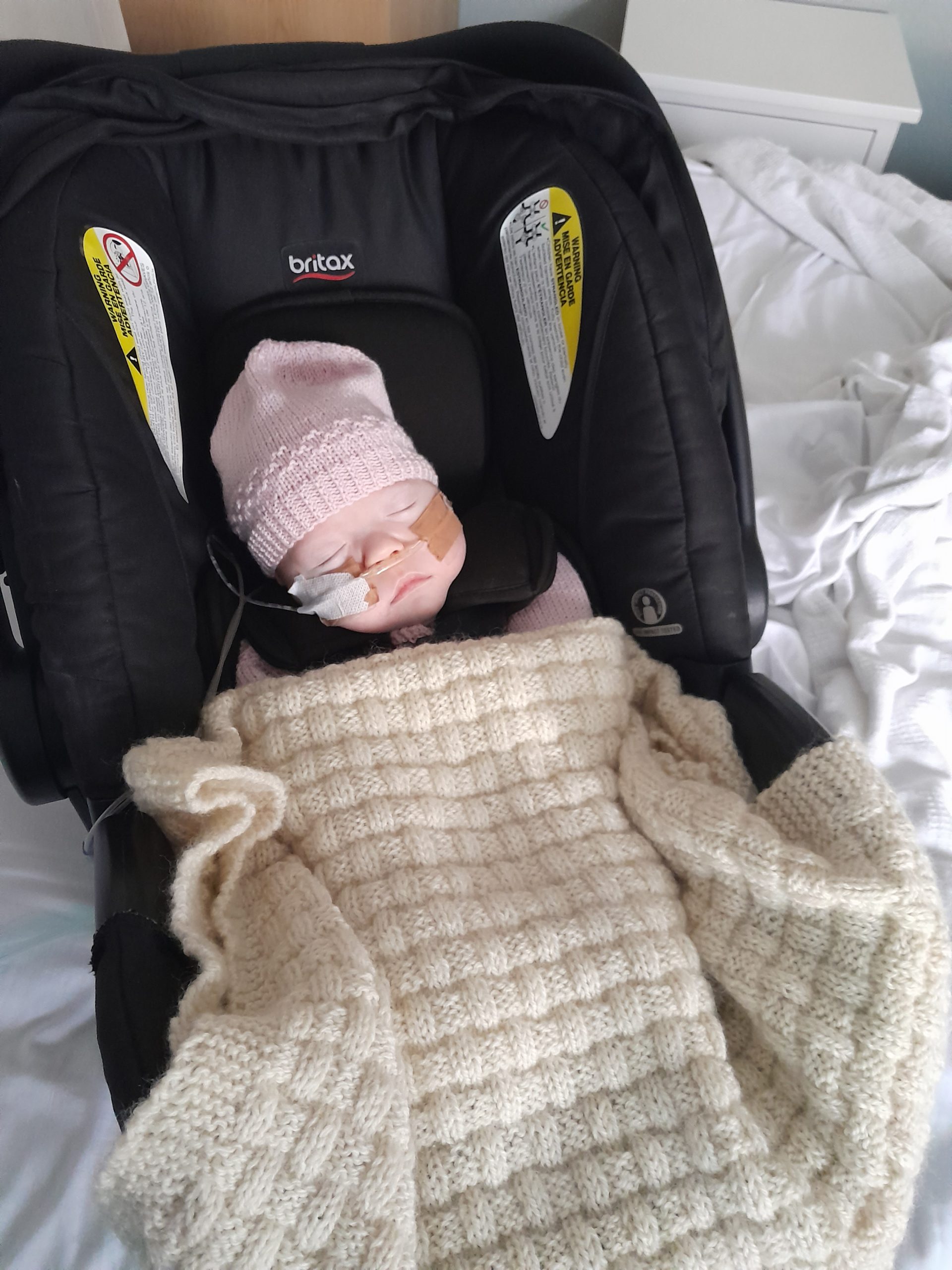
4 months after Emilys discharge from hospital, she was able to lose the oxygen and her lungs had finally caught up with her. It was such a luxury to finally be able to move about with her without being tethered to an oxygen tank. There was 4 months of retaping her oxygen tubes and NGT as the tubes and tape moved overtime. This was so horrible for Emily; the adhesive removal, skin being pulled in each direction, and finally being retaped again. This was not something I missed! I’m amazed that Emily’s skin on her cheeks has recovered so well after being covered up for so many months.
A consequence of Emily losing her oxygen was that she had better access to her NGT, and no matter how well we taped it, she managed to get her little fingers in there and rip it out. Another awful job to do; reinserting NGT’s. I think in a space of 10 days she had ripped it out about 4 or 5 times which meant either a community nurse visiting if they had time or a visit to the paediatric ward in hospital. In the end we decided to test Emily without her NGT to see how she coped. She was still pretty inconsistent with her milk feeds, but she was carrying a healthy amount of weight. As it turned out her weight did stagnate for a week or 2, but then she got into her groove and started consistently taking full bottles. What a relief as I was quite anxious for those few weeks wondering if we had made the right decision (we were still under the guidance of our community nurse). Emily was tube free 5 months approximately from her discharge day. It was the loveliest of feelings seeing her face fully.
Emily has maintained reasonable health since hospital. She was admitted to hospital for 4 nights after contracting a virus around 6 months corrected age. Her little lungs just didn’t cope and needed oxygen again. She had oxygen at home for another week and then recovered fully. This has me a little worried as we hadn’t even got to Winter at this point! We are aware that this might happen a few times in the coming years as she’s exposed to bugs and her lungs can’t quite cope.
I’ve already mentioned a few people/organisations that we have been truly grateful for. I would also like to mention the Ronald McDonald House where we stayed in Wellington. What an amazing facility. The communal areas were so well set up, and areas for the kids as well which I know Leo appreciated. There were special packages for us as well – pyjama day saw us receive a box of goodies to make up waffles with all the toppings. On Father’s Day there was little goodies left outside our door. They also organised once or twice a week for local corporate businesses to come in and cook meals for all the families. It was so lovely to have this available for us and made our difficult time just that little bit easier. If there is any opportunity for you to donate to Ronald McDonald Charities, please do what ever you can.
To any families reading this and currently on their own NICU journey, my heart goes out to you. Its such a difficult time and no one has the same experiences as the next as our wee babies are all different with their own medical needs. As much as the days are slow and very much ground hog day, it does pass and you will get back to a new normal. It’s such a hard slog being inside the unit all the time, so make sure you take time out for yourself, a walk around the block, a coffee or lunch somewhere nearby. Connect with other parents in the unit if you can – it’s a club that no one wants to belong to, but we all share in the same challenges in being there. No one can quite understand what you are going through except those who are going through it as well.
Thank you lastly to the Little Miracles Trust. What an amazing organisation, who have an abundance of information and resources in person and on their website. The little gift bag we received at the beginning was very appreciated and we still use our little cooler bag on the regular! The little treats we received in hospital and presents for the fathers on Father’s Day was all organised by them, and just like the Ronald McDonald House, made our difficult time that little bit easier.
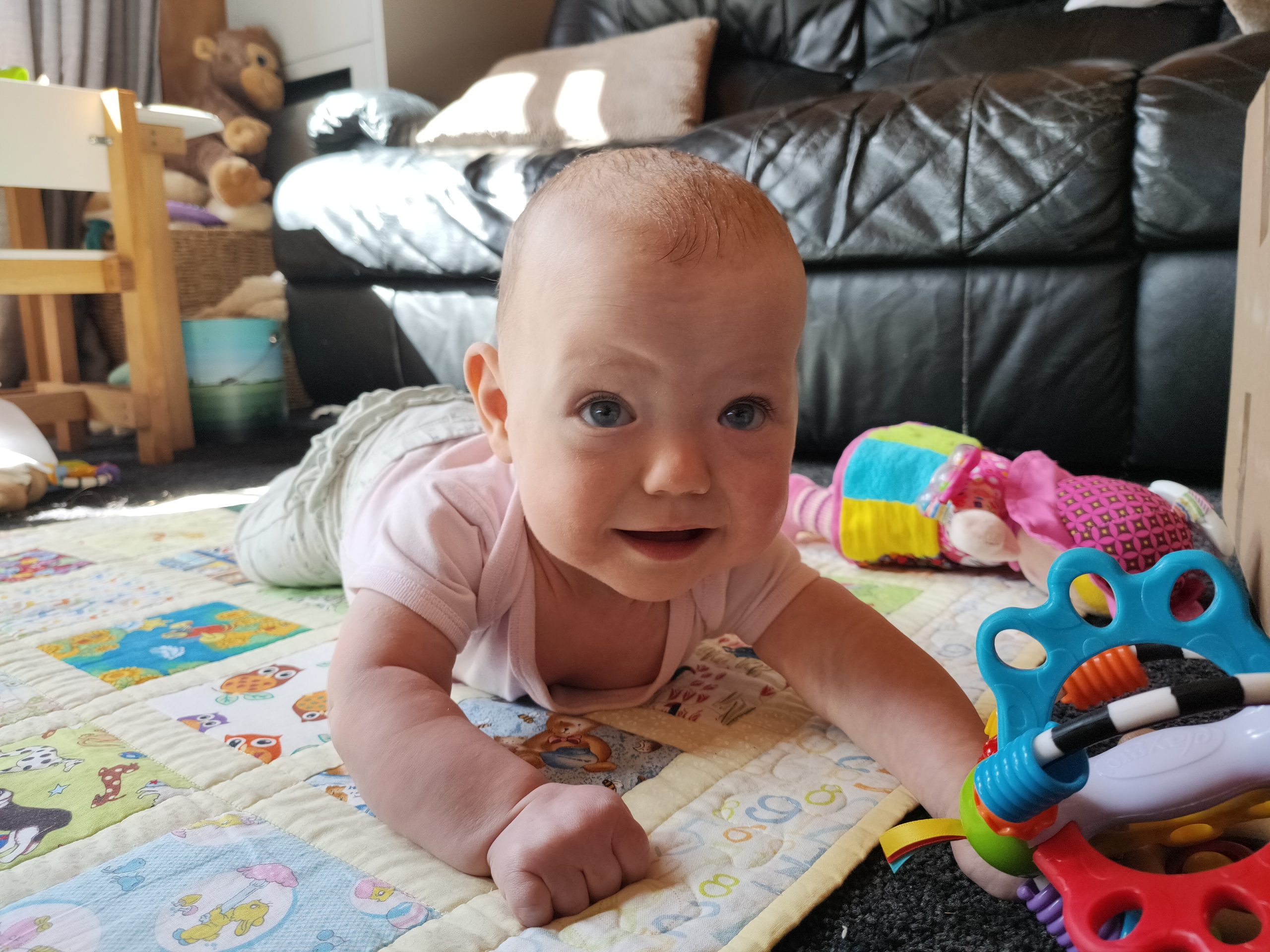
Thanks so much for sharing your personal story.
We get a lot of positive feedback from families in a neonatal unit who read these stories and feel strength, hope and positivity knowing that they are not alone going through these experiences and feeling certain emotions.
If you would like to discuss sharing the story of your neonatal journey, we’d love to hear from you. Please email info@littlemiraclestrust.org.nz
If you want to help our support of families going through the stress and anxiety of a neonatal journey, you can donate here.
- The Little Miracles Trust provides support to families of premature or sick full-term babies as they make their journey through Neonatal Intensive Care, the transition home, and onwards. We do not receive any Government funding and are entirely reliant on the generosity of individuals, companies and organisations in the form of donations, value-in-kind donations, grants, sponsorship and fundraising events to supplement operating costs and fund our services and initiatives.
- As we are a registered charity (CC56619) with Charities Services New Zealand we will send you an IRD compliant tax receipt – this will happen automatically by return email
